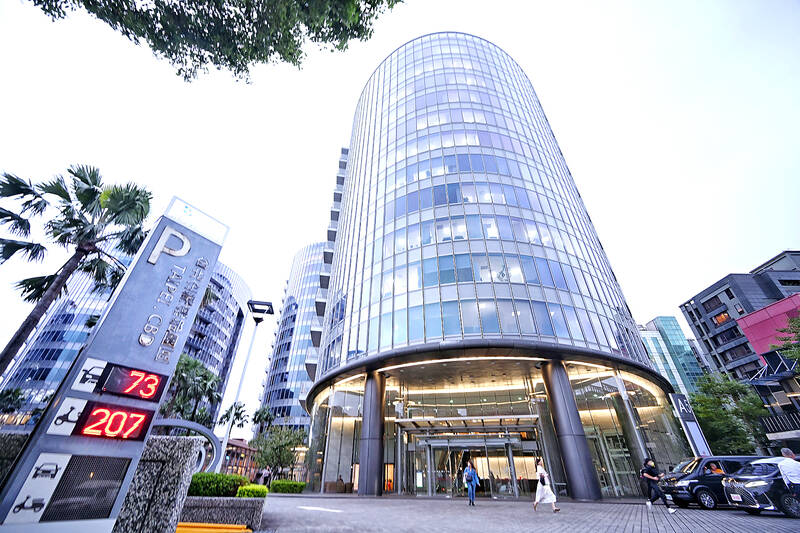Formosa Plastics Group (台塑集團), Taiwan’s largest industrial conglomerate, yesterday said that three major subsidiaries incurred losses last quarter while the fourth eked out a tiny profit, as soft market demand and price competition weighed on their earnings.
Nan Ya Plastics Corp (南亞塑膠), whose main business involves making processed plastic and chemical products, electronic materials and polyester fiber, recorded NT$60 million (US$1.86 million) of net profit during the July-to-September period, or earnings of NT$0.01 per share, the company said.
The lackluster results suggested a slowdown from three months earlier, while declining international oil prices weighed on plastic and chemical products.

Photo: Fang Pin-chao, Taipei Times
Their profit margin was also harmed by unfavorable currency exchange rates and the need to recognize losses in the affiliated Formosa Petrochemical Corp (台塑石化), it said.
However, selling prices picked up for materials used in polyester and printed circuit boards ahead of the high sales season for technology products, it added.
Formosa Petrochemical Corp (台塑石化), primarily engaged in the business of refining crude oil, selling refined petroleum products and producing and selling olefins from its naphtha cracking operations, booked losses of NT$3.08 billion, or NT$0.32 per share, worsening from three months earlier, it said.
The privately owned refinery attributed the poor showing to tepid demand and oil export nations’ announcement that they would cut output from December amid a supply glut.
The drop in oil prices grew more evident last quarter and deepened losses of inventory and purchased materials, the company said.
Inventory losses alone amounted to NT$2.42 billion, surging from NT$170 million in the April-to-June period, it said.
Formosa Plastics Corp (台灣塑膠), a vertically integrated supplier of plastic resins and petrochemicals, reported losses of NT$3 billion, or NT$0.49 per share, as it idled seven plants to conduct annual maintenance, up from four in the preceding quarter, the company said.
The bleak figures stemmed from unprofitable core businesses and unfavorable influences of Typhoon Gaemi in July that disrupted the operation of plants in Kaohsiung and weakened their output, it said.
At the same time, raw material prices remained high, putting pressure on the profit margin, it said.
The company also recognized losses from indirect investments in affiliated businesses in Taiwan and in the US.
Formosa Chemicals and Fibre Corp (台灣化學纖維), which produces and sells petrochemical products, nylon fibers and rayon staple fibers in Taiwan and internationally, posted losses of NT$1.93 billion, or NT$0.33 per share.
Listless market demand and selling prices were to blame, the company said, adding that it is reducing capacity to speed up inventory adjustments.
The company is closely monitoring China’s latest stimulus measures and would move to take advantage of any business opportunity, it said.

SEMICONDUCTORS: The German laser and plasma generator company will expand its local services as its specialized offerings support Taiwan’s semiconductor industries Trumpf SE + Co KG, a global leader in supplying laser technology and plasma generators used in chip production, is expanding its investments in Taiwan in an effort to deeply integrate into the global semiconductor supply chain in the pursuit of growth. The company, headquartered in Ditzingen, Germany, has invested significantly in a newly inaugurated regional technical center for plasma generators in Taoyuan, its latest expansion in Taiwan after being engaged in various industries for more than 25 years. The center, the first of its kind Trumpf built outside Germany, aims to serve customers from Taiwan, Japan, Southeast Asia and South Korea,

Gasoline and diesel prices at domestic fuel stations are to fall NT$0.2 per liter this week, down for a second consecutive week, CPC Corp, Taiwan (台灣中油) and Formosa Petrochemical Corp (台塑石化) announced yesterday. Effective today, gasoline prices at CPC and Formosa stations are to drop to NT$26.4, NT$27.9 and NT$29.9 per liter for 92, 95 and 98-octane unleaded gasoline respectively, the companies said in separate statements. The price of premium diesel is to fall to NT$24.8 per liter at CPC stations and NT$24.6 at Formosa pumps, they said. The price adjustments came even as international crude oil prices rose last week, as traders

SIZE MATTERS: TSMC started phasing out 8-inch wafer production last year, while Samsung is more aggressively retiring 8-inch capacity, TrendForce said Chipmakers are expected to raise prices of 8-inch wafers by up to 20 percent this year on concern over supply constraints as major contract chipmakers Taiwan Semiconductor Manufacturing Co (TSMC, 台積電) and Samsung Electronics Co gradually retire less advanced wafer capacity, TrendForce Corp (集邦科技) said yesterday. It is the first significant across-the-board price hike since a global semiconductor correction in 2023, the Taipei-based market researcher said in a report. Global 8-inch wafer capacity slid 0.3 percent year-on-year last year, although 8-inch wafer prices still hovered at relatively stable levels throughout the year, TrendForce said. The downward trend is expected to continue this year,

POWERING UP: PSUs for AI servers made up about 50% of Delta’s total server PSU revenue during the first three quarters of last year, the company said Power supply and electronic components maker Delta Electronics Inc (台達電) reported record-high revenue of NT$161.61 billion (US$5.11 billion) for last quarter and said it remains positive about this quarter. Last quarter’s figure was up 7.6 percent from the previous quarter and 41.51 percent higher than a year earlier, and largely in line with Yuanta Securities Investment Consulting Co’s (元大投顧) forecast of NT$160 billion. Delta’s annual revenue last year rose 31.76 percent year-on-year to NT$554.89 billion, also a record high for the company. Its strong performance reflected continued demand for high-performance power solutions and advanced liquid-cooling products used in artificial intelligence (AI) data centers,